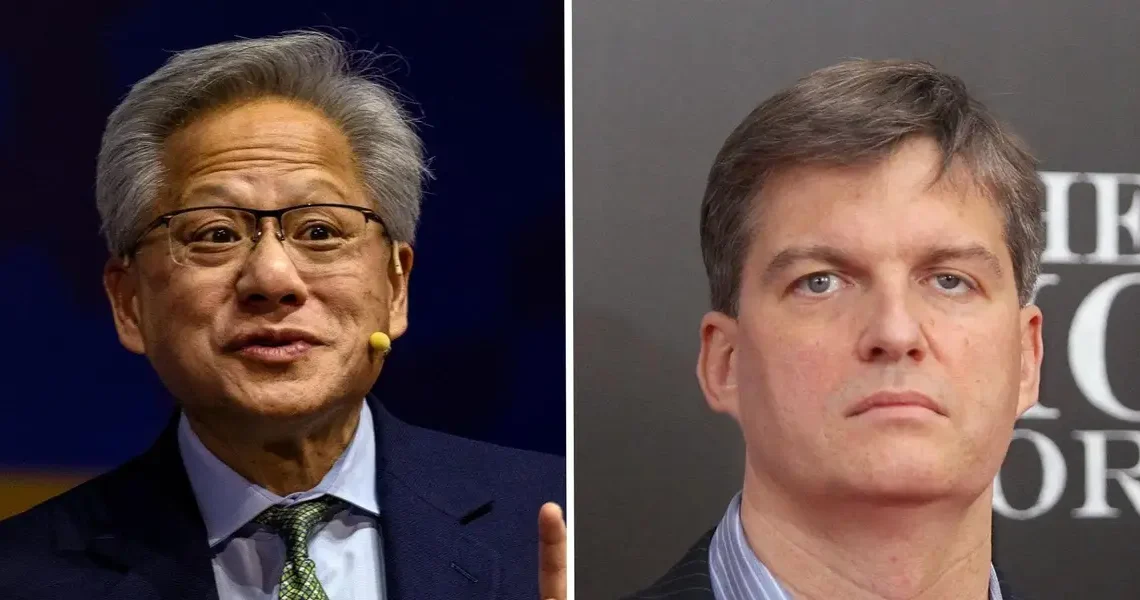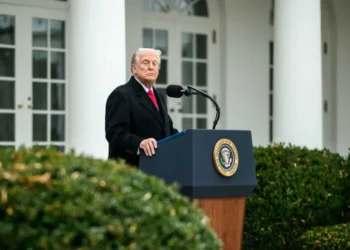Michael Burry has continued his crusade against Nvidia and the broader AI boom, even after the chipmaker’s bosses reported blowout earnings and responded to two of his chief concerns.
Nvidia told investors not to worry
Nvidia’s record revenue and profit last quarter, and its bullish fourth-quarter growth forecast, sent its stock up 5% in premarket trading on Thursday as investors brushed off Burry’s warnings that AI stocks are in a bubble that’s bound to burst.
The company’s finance chief, Colette Kress, said on the earnings call that Nvidia had “visibility to $0.5 trillion in Blackwell and Rubin revenue” over the course of 2025 and 2026, and estimated “$3 trillion to $4 trillion in annual AI infrastructure build” by 2030.
Nvidia CEO Jensen Huang opened his remarks by saying: “There’s been a lot of talk about an AI bubble. From our vantage point, we see something very different.”
Kress said that Nvidia’s CUDA software, which enables its older chips to run newer software and AI apps, has extended the life of the company’s systems “well beyond their original estimated useful life.”
“Thanks to CUDA, the A100 GPUs we shipped six years ago are still running at full utilization today,” Kress said. She emphasized that point by also saying “our GPU installed base, both new and previous generations, including Blackwell, Hopper, and Ampere, is fully utilized.”
Burry doubled down on his Nvidia critique
Burry, the investor of “The Big Short” fame, fired back with a barrage of X posts. In the first, he doubled down on his concern that AI giants are flattering their earnings by dragging out the depreciation of their computing equipment.
The fact that Nvidia’s customers are still using older chips doesn’t mean their “useful life” from an accounting standpoint is longer, he said, as that “confuses physical utilization with value creation.”
“Just because something is used does not mean it is profitable,” Burry wrote. He gave the example of airlines retaining old planes to boost their capacity during the holiday season, even though they’re only “marginally profitable” and “not worth much at all.”
Burry — who recently closed his hedge fund, Scion Asset Management, to outside clients — underscored that Nvidia’s older chips are far less energy efficient than its newer ones, so customers still using them are likely paying much bigger electricity bills.
“If that is the direction you are going, chances are you have to be doing it, and it is not pleasant,” he wrote.
The idea of a useful life for depreciation being longer because chips from more than 3-4 years ago are fully booked confuses physical utilization with value creation. Just because something is used does not mean it is profitable. GAAP refers to economic benefits.
Airlines keep…— Cassandra Unchained (@michaeljburry) November 19, 2025
In his second post, Burry called out the tangled web of multibillion-dollar “give-and-take deals” between Nvidia and other AI companies, including OpenAI, Microsoft, and Oracle.
“True end demand is ridiculously small,” he wrote. “Almost all customers are funded by their dealers.”
In a third post, he wrote that Nvidia has bought back nearly $113 billion worth of stock since the start of 2018, yet it has 47 million more shares outstanding.
While stock-based compensation was $20.5 billion during that period, he said, the “true cost of that SBC [stock-based compensation] dilution was $112.5 billion, reducing owner’s earnings by 50%.”
Burry finished his flurry of AI posts with a simple question: “One more. OpenAI is the linchpin here. Can anyone name their auditor?”
Nvidia did not immediately respond to a request for comment.
One man’s crusade against AI
Burry, who shot to fame after his contrarian bet against the mid-2000s housing bubble was featured in the book and movie “The Big Short,” recently returned to X after a two-year hiatus, marking his comeback with a flurry of warnings about an AI bubble.
The veteran investor has drawn parallels between the AI boom and the dot-com bubble, warning the so-called hyperscalers that are plowing hundreds of billions of dollars into microchips and servers are at risk of overinvesting and never seeing a return on their money.
These aren’t the charts you are looking for.
You can go about your business. pic.twitter.com/ICldNUp2OI— Cassandra Unchained (@michaeljburry) November 3, 2025
Moreover, Scion disclosed that at the end of September, it owned bearish put options on 1 million Nvidia shares and 5 million Palantir shares worth a notional $187 million and $912 million, respectively.
The bets drew the ire of Palantir CEO Alex Karp, spurring Burry to fire back. He later implied on X that he wasn’t short and had disposed of the Palantir puts in October.
Read the original article on Business Insider
The post ‘Big Short’ investor Michael Burry takes aim at Nvidia after its earnings blowout appeared first on Business Insider.




